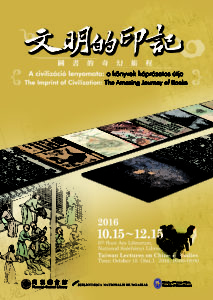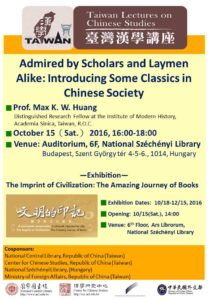A civilizáció lenyomata: a könyvek káprázatos útja – kiállítás az Országos Széchényi Könyvtárban.

Megnyitó: 2016. október 15. 14.00
Program:
2016. október 15. (szombat), 14 – 18 óra között
14:00–14:15 A vendégeket köszönti: Íjgyártó István KKM államtitkár & Wen-Lung Tao képviseletvezető
14:15–14:30 Tradicionális tajvani élőzene
Kína-kutatás Tajvanon – tudományos előadás
Helyszín: Díszterem, VI. emelet
14:30–15:45 Prof. Max K. W. Huang Kína- kutató tudományos előadása angol nyelven (Academia Sinica, Tajvan, Modernkori Történeti Intézet)
15:45-16:00 Teakóstolás
Kiállításmegnyitó
Helyszín: Ars Librorum, VI. emelet
16:00–16:10 Tradicionális tajvani élőzene
16:10–16:30 A kiállítást megnyitja: Tüske László főigazgató és Shu-hsien Tseng főigazgató
16:30–17:00 Vezetett séta
17:00–18:00 Fogadás
Előadás
2016. október 15. 16.00-18.00
Topic: Admired by Scholars and Laymen Alike: Introducing Some Classics in Chinese Society.

Title: Admired by Scholars and Laymen Alike: Introducing Some Classics in Chinese Society
Professor Max K. W. Huang
Distinguished Research Fellow at the Institute of Modern History, Academia Sinica, Taiwan, R.O.C.
Abstract
We use the term “Classics” to indicate the books which serve as a standard of excellence and exert lasting influence. In Chinese society, there are numerous classics. They include Confucian, Daoist, and Buddhist works with philosophical values, as well as historical and literary works with beautiful words and intriguing plots. In this talk, I will introduce some Chinese classics with which I grew up with in Taiwan from the 1960s to 1980s. Special attention will be paid to those books available in English and Hungarian translations. I will introduce several representative philosophical works: the Analects, Lao zi and Buddhist sutras. As for historical and literary works, I will introduce The Records of the Grand Historian, Tang Poems, Best of Classical Prose, Journey to the West, the Dream of Red Chamber, and The Golden Lotus. How do Chinese people read these books? And how do these books influence Chinese people’s behavior and thought in modern times? These books are like a window, through which we can understand why Chinese culture has a long history and remains vital in modern times.
About the Speaker:
Dr. Max K. W. Huang was born in Taipei, Taiwan in 1957. He received his bachelor’s and master’s degrees in History from National Taiwan Normal University. He subsequently pursued his studies in the United Kingdom and the United States, receiving a second master’s degree from Oxford University and his Ph. D degree from
Stanford University. He is a distinguished research fellow at the Institute of Modern History, Academia Sinica. His major fields are Ming-Qing studies and Modern Chinese intellectual history. He has published six books and more than 80 articles. Dr. Huang’s most recent book is If It’s not Dirty, It’s No Joke: Humor, Desire, and the Body in the World of Modern Chinese Masculinity. His latest book is Government and Politics in Taiwan (Rouledge, 2011). He has a new co-edited volume titled Migration to and from Taiwan (Routledge, 2014).
